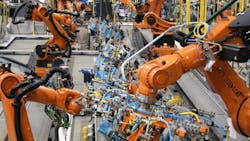Increased Productivity is Key for Healthy Manufacturers, Healthy Economy
In today’s hypercompetitive global economy, even the best manufacturers need to continuously boost productivity to survive. However, a growing number of pundits, activists and policymakers now argue that productivity causes job loss and therefore is bad for the economy. They are wrong.
MIT professors Andrew McAfee and Erik Brynjolfsson have written one of the most prominent books making this claim, Race Against The Machine. In it, they state that “it may seem paradoxical that faster progress can hurt wages and jobs for millions of people, but we argue that’s what’s been happening.”
Other prominent academics have argued the same thing, including Paul Krugman, Richard Posner, and Brian Arthur. The popular press is also getting in on the bandwagon, with major features on CBS’s 60 Minutes, as well as in the Associated Press, The New York Times, The Economist, The Atlantic, andThe Financial Times.
Before you throw your smartphone out the window, however, you should take some comfort in the following: there is no scholarly evidence that increasing productivity increases unemployment or lowers total employment growth in an economy, except possibly in the very short term. In fact many studies find that rising productivity is almost always associated with lower unemployment.
Evidence from firms in a range of sectors likewise finds that while some firms shed jobs as they get more productive, a roughly equal number of firms actually add workers.
A review of U.S. history finds the same result. As the McKinsey Global Institute found, since the Great Depression productivity growth in the United States has gone hand in hand with increasing employment in the medium and long term.
Only in the short-term, 1-3 years, is there any evidence of “jobless growth”, and even then it is rare. Similarly, studies of nations around the world have found no causal link between productivity and unemployment, whether in developing nations or developed ones.
Increased Productivity Leads to Reduced Production Costs
So why doesn’t increased productivity lead to fewer overall jobs? When manufacturers, or any businesses for that matter, increase their productivity they reduce the costs of production. Why else would they invest in productivity?
Reduced costs save money—and that means the business owners, the customers, the workers, or all three have more money to spend on other things. That extra money gets recycled in the economy and leads to more overall demand. That demand leads firms to hire workers to meet it, and their higher productivity means higher living standards.
Unfortunately it is too easy to ignore the benefits and emphasize the problems associated with productivity.
In other words, productivity ends up with too much blame and not enough credit. The United States has always been an innovative nation and now, as other nations are learning from us and becoming serious competitors, increasing productivity is even more essential to our competitiveness.
Some may argue, what is the big deal? After all, who cares what popular opinion thinks as long as there are still obvious incentives for businesses to innovate? In other words, why should manufactures care what some academics and advocates think? To see why one only needs to look to France, where widespread resistance to productivity-enabled downsizing has led to large, public opposition of firms that institute new productivity enhancing processes.
As more and more of America, not just average Americans but also the elite, buys into the insidious notion that productivity kills jobs, manufacturers that are aggressive about driving productivity improvement risk condemnation.
Moreover, while individual manufactures play the key role in driving productivity in their firms, the public sector has a supportive role to play. Public funding for research and development, especially related to technologies like robotics and other automation processes, can improve productivity and competitiveness.
Tax incentives, like an investment tax credit, can also make it more affordable to invest in equipment and software to drive productivity.
As the “productivity kills jobs” messages become even more widespread, support for these productivity-enhancing policies will fall.
So it’s time to reject the neo-Luddite narrative that machines destroy jobs, and instead embrace an anti-Luddite one that says we need more machines, more robots, more automation, and more productivity.
About the Author
Robert Atkinson
President, ITIF
The Information Technology and Innovation Foundation (ITIF) is a non-partisan research and educational institute – a think tank – whose mission is to formulate and promote public policies to advance technological innovation and productivity internationally, in Washington, and in the states. Recognizing the vital role of technology in ensuring prosperity, ITIF focuses on innovation, productivity, and digital economy issues.
